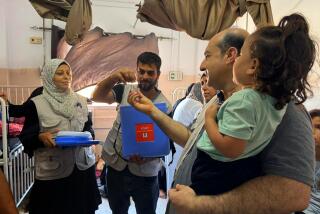Third World Leaders, Communities Credited : 1 Million Children Saved, UNICEF Says
- Share via
The lives of more than a million Third World children have been saved in the last 12 months as a result of a surge of interest from national leaders and community groups in vaccination programs and in a simple treatment for childhood diarrhea, the United Nations Children’s Fund announced Wednesday.
Although vaccines that prevent childhood diseases have long been available, officials said the accelerated pace is a result of improved vaccine technologies and the application of new strategies for reaching a much greater proportion of parents.
The U.N. agency, also known as UNICEF, said in a report titled “State of the World’s Children: 1986” that an immunization rate that averaged less than 5% in some developing countries several years ago has in the last 18 months been pushed to 60% to 80%.
Among those countries are El Salvador, Nicaragua, the Dominican Republic, Bolivia, Brazil, Colombia, Pakistan, Turkey, Burkina Faso, Lesotho, Saudi Arabia, Zimbabwe and parts of India and China, according to the report.
The World Health Organization, working in concert with UNICEF, the Pan-American Health Organization and U.S. Agency for International Development, has a goal of immunizing all children against childhood diseases by 1990. Vaccine-preventable diseases, which include diphtheria, whooping cough, tetanus, measles and polio, kill almost 4 million children annually and permanently disable 4 million more, the report said.
It noted that a growing acceptance of oral rehydration therapy, a simple technique for preventing and treating the dehydration caused by diarrhea--which also kills 4 million children each year--was responsible for preventing an estimated 500,000 infant deaths last year.
At the same time, however, a supplement to the report entitled “Within Human Reach--A Future for Africa’s Children” warned that more than 17 million children under age 5 in Africa suffer from malnutrition, a trend that will harm the continent’s development for generations.
In some countries--Ghana and Burkina Faso, for example--more than 40% of children under 5 are malnourished. It is known that malnutrition during early childhood can result in brain damage.
Describing recent successes in immunization, the UNICEF report gave much of the credit to the commitment by the political leaders of a growing number of developing countries to a new strategy of “social mobilization” in which a country uses all its social organizations, not just health workers, to campaign against disease in ways not previously attempted in most of the Third World.
An campaign in Colombia, for example, succeeded in immunizing 75% of the children under 4 years old by enlisting 120,000 volunteers, the police, the armed forces, Red Cross, 200,000 teachers, 2,000 priests, millions of handbills and the mass media to inform parents where, when and why to have their children vaccinated.
War Zone Immunizations
Last winter, despite a guerrilla war, social mobilization in El Salvador resulted in about 250,000 of the nation’s 400,000 children being immunized, including those living in battle areas, according to the report. Organizations ranging from Boy Scouts to Rotary clubs took part.
Important to the success, the UNICEF report said, was an agreement by government and guerrilla leaders, encouraged by Roman Catholic prelates, to cease hostilities on three “days of tranquillity” spaced a month apart during which 20,000 volunteers and health workers gave the shots throughout the country. House-to-house visits by 3,100 health workers to find and inform parents were credited with overcoming a 58% rural illiteracy rate that authorities had feared might keep attendance down.
According to UNICEF officials, a visit to the Vatican last year by key U.N. children’s fund officials was crucial to laying the groundwork for participation by Roman Catholic volunteers and priests, who publicized the campaigns in their sermons.
“Encouraging words went out to Asia, Latin America and elsewhere, and suddenly we found local advocacy picked up steam,” James Himes, chief of the Americas section said, in a telephone interview.
‘Overcome the Skepticism’
Similar person-to-person visits with similar effects were made by James P. Grant, executive director of UNICEF, to the presidents of a number of nations.
“Political leaders can overcome the skepticism of bureaucrats who are used to business as usual,” Himes said.
Numerous reports by international agencies have noted that health ministries in many developing countries lack a systematic approach to immunization programs, have little coordination with other programs within the ministry, lack both political and financial support and at certain levels have insufficient technical information on immunization.
Unlike most countries in which immunization and other public health programs depend solely on government and private health workers to create demand, Cuban and Nicaraguan political leaders have long made use of mass organizations to make sure that programs succeed. As a result, Cuba and Nicaragua have exceptionally good immunization records, according to international health experts.
Aside from the strategy of social mobilization, a second reason for the striking progress, the report said, is a “supply breakthrough” brought about by improved vaccines, better methods of keeping vaccines at low temperatures in the tropics (heat destroys their potency) and by the training of more health workers.
Mobilization Credited
It is social mobilization, however, that is harnessing the technology and medical know-how in ways that make them available to millions of children who previously have not benefited, the report said.
Addressing the question of whether increased child survival will lead to more rapid population growth, the report said the experiences of China, Sri Lanka and Costa Rica, which have already achieved a revolution in child survival, have shown that this is not so.
“Many parents ‘ensure’ against child deaths by having more children. If parents become confident that their existing children will survive, they tend to have only the number of children they actually want,” the report said.
”. . . It has been estimated that a country which has halved its infant mortality over the last two decades can now expect its population to stabilize at a level 30% to 40% smaller than would otherwise have been the case.”
More to Read
Sign up for Essential California
The most important California stories and recommendations in your inbox every morning.
You may occasionally receive promotional content from the Los Angeles Times.













